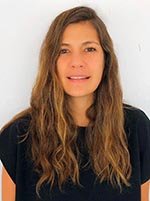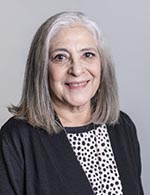 An Interview with Mariana Campos Gutierrez in Mexico City Interviewed by MariaEugenia A. MacWilliams, OPN-CG
An Interview with Mariana Campos Gutierrez in Mexico City Interviewed by MariaEugenia A. MacWilliams, OPN-CG
Mariana Campos Gutierrez is a psychotherapist and hospital psychologist in Mexico City. Co-founder of the Hospital Emotional Support Group (SoHMa), which provides psychological care to patients, family members and health professionals in oncology and HSCT in different hospitals. She provides collegiate lectures and classes in psychoeducation, focusing on health professional burnout. She has co-authored books, articles and manuals discussing psychoeducation
Who is SoHMa and how do you support oncology patients?
SoHMa is a specialized psychological care center serving cancer or hematopoietic stem cell transplant patients. The organization can provide training to patients, families and healthcare professionals on issues related to mental health and personal process. SoHMa also creates and provides didactic and psychoeducational resources (toys, manuals, brochures, books).
How has your experience been during the COVID-19 pandemic?
The pandemic shook up everyone, exposing great vulnerability in people, human health and mortality. Worldwide, we began living in similar circumstances to oncology patients; wearing face masks, isolation, anxiety and fear of infection.
As COVID-infected people filled hospitals, radical changes in admission policies, hospitalization rules and physical areas became necessary. Some hospitals even closed their doors to cancer patients and became Covid centers. But cancer does not wait, so patients had to continue their treatments as the best they could.
The hospitals that we work with never doubted that our services should continue. We continued much as before, though with some changes regarding workspaces and tools. We also introduced virtual therapy.
During the pandemic, what ethical dilemmas arose?
The most important, hospitals public and private, began separating relatives and guardians from pediatric patients if anyone was COVID-infected or suspected. Even special needs population.
How did you address this dilemma?
We created the Mexican Group of Pediatric Psychology, composed by several countries. We did extensive research including a literature review, drawing on clinical experience and interviews with psychiatrists, infectologists, epidemiologists and pediatricians, from several countries, to understand the entire context and psychological consequences generated in patients and families, resulting from separation of minor patients from their caregivers.
As a result, we came up with the following:
- Proposed recommendations for protecting the biopsychosocial health of pediatric patients hospitalized for COVID and attendant healthcare personnel
- Integrating a patient family member into a health team as a co-assistant, to reduce exposure to contagion, workload, and risk of health worker burnout
- Avoid serious psychological consequences caused by separation anxiety during hospitalization for patients and families
- Define and unify care criteria in the participating country’s hospitals.
We presented the final document to Mexico’s Secretary of Health and the summary is available on their website Recommendations for the integration of the primary caregiver as a co-auxiliary of the healthcare team during hospital stay of pediatric patients with COVID-19
This guide justifies and endorses possible repercussions on pediatric patients and hospital personnel that result from separation.
Did the hospitals implement the recommendations?
Recommendations were difficult to implement. So, we successfully took our findings to the hospitals we worked with one by one, spreading it on networks and with the specialists involved. Our group donated PPE to patient families so the lack of it could not be a barrier. We are now conducting a study to determine whether family members being with patients increases patient COVID-19 infection.
What is still needed to better support patients subjected to separation?
Broader dissemination and use of the GMPP recommendations in Mexico’s hospitals.
Flexibility, to better understand that pediatric patients cannot be managed as adults and expanding guidelines.
Lessons Learned
In many of Mexico hospitals separation continues. Mental health is a fundamental part of patient life processes and wellbeing. This is especially true for oncology patients, and this separation practice harms psychological well-being and presents an ethical dilemma with moral consequences for healthcare providers. The main lesson that we continue to advocate, is preventing separation of pediatric patients from their relatives.
Secondly, training medical personnel in patient psychological needs is important.
Lastly, the collaboration of different specialists in different parts of the world is very pleasant and effective as we achieved greater results.

